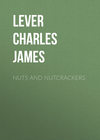Kitabı oku: «The Daltons; Or, Three Roads In Life. Volume I», sayfa 18
Bir şeyler ters gitti, lütfen daha sonra tekrar deneyin
Türler ve etiketler
Yaş sınırı:
12+Litres'teki yayın tarihi:
28 eylül 2017Hacim:
590 s. 1 illüstrasyonTelif hakkı:
Public Domain









